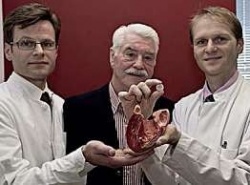A Stroke prevention device
Patients with atrial fibrillation, so at risk of stroke, are usually treated with medication to prevent coagulation. The Hanover Medical School (MHH) has devised an alternative treatment.

Atrial fibrillation is the most common type of cardiac arrhythmia in adults and its occurrence further increases with the increasing life expectancy of the general population. However, medication used to prevent coagulation can have significant side effects, from complications with bleeding to the necessity of blood tests through the GP at very close intervals.
The cause of strokes in patients with atrial fibrillation in many cases is an accumulation of blood clots in the cardiac auricle. These blood clots can then separate and travel to the brain, where they can cause a stroke.
Doctors at Hanover Medica School have been implanting in the left atrial auricle an umbrella with a diameter of about 3cm. This ‘cardiac auricle’ is then occluded with the help of an umbrella. ‘Through the occlusion of the left atrial auricle with a type of miniature umbrella strokes can be prevented as effectively as with medication,’ explained Professor Gunnar Klein, Head of the Department of Cardiology and Angiology. ‘In the long term, patients can do without regular administration of anticoagulants once they have undergone this catheter-supported intervention, which is carried out through the groin.’
The procedure is particularly suitable for patients at increased risk of stroke because of atrial fibrillation, i.e. patients over 75 who have already suffered a stroke or those who suffer from chronic cardiac insufficiency, diabetes or high blood pressure.
The intervention is carried out under local anaesthetic and takes about 30-45 minutes. Patients can get up and walk after six hours and are discharged the following day.
The procedure is covered by medical insurers.
Source: Medizinische Hochschule Hannover (Hanover Medical School)
21.11.2009





